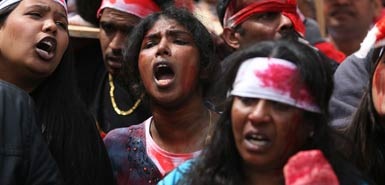by Stuart Cosgrove
 Maryhill has a special place in urban folklore. It’s the spiritual home of Partick Thistle, a gangland where the Maryhill Fleet once roamed, and for the fearful bourgeoisie of Glasgow’s west end it’s “bandit country”, just beyond the Byres Road.
Maryhill has a special place in urban folklore. It’s the spiritual home of Partick Thistle, a gangland where the Maryhill Fleet once roamed, and for the fearful bourgeoisie of Glasgow’s west end it’s “bandit country”, just beyond the Byres Road.
Yesterday, Maryhill defied the new world order to play a minor role on the epic stage of global politics. At 8.30am, shops lifted their shutters and the rattling noise of corrugated metal woke the dead. A queue of voters huddled together in the damp cold, waiting outside Woodside Hall in Glenfarg Street to cast a precious vote for Eelam, which means homeland in Tamil. Maryhill was chosen as a polling station in a global referendum organised by expatriate Tamils in their tense stand-off with Sri Lanka, a country that has resisted their independence.
Woodside Hall has the air of dank municipality — it’s more accustomed to jumble sales and ska discos than making history — but the Maryhill referendum is a fascinating story of democracy withheld, with more plotlines than a political thriller and enough constitutional twists to send Scotland’s political intelligentsia into paroxysms of near-erotic delight.
My interest went beyond the observational. I was there to cast my vote. My wife, Shirani Sabaratnam, is a native Tamil speaker from Jaffna, on the northern peninsula of Sri Lanka. She still holds Sri Lankan citizenship and, as a “qualifying spouse”, I am allowed to participate in the poll. So, strange as it seems, the stubby pencil of democracy was rightfully mine.
As I handed over my identity papers, I was acutely aware of the paradox. Voting Yes/Yes in the 1997 Scottish referendum on devolution seemed natural; voting in a referendum on Tamil independence was an unexpected experience. Unless there is a sea change in the factional Scottish parliament in the months ahead, it is a vote I will not be able to cast in a Scottish constitutional context, no matter how mundane the backdrop.
The voters spoke of home, and traded memories. Some wore the red and yellow colours of Tamil nationalism. Coincidentally, in Maryhill, they’re the colours of the local football team, Partick Thistle, who were playing away in Inverness to avoid misunderstanding.
Tamils have for decades fought a relentless battle with successive Sri Lankan governments, demanding greater civil rights. With well-organised communities in Toronto, London and Paris, the Tamils are the undisputed world champions of diaspora politics.
Many thousands flocked to Westminster to disrupt the business of Parliament at the emotive heights of the civil war last year. Glasgow’s Tamil community is smaller but no less committed, with enclaves in Sighthill, Dumbarton Road and the east end. Some are students, some are professionals forced into economic migration, and many are political exiles or asylum-seekers displaced from the war-torn north of Sri Lanka.
My wife’s journey is part of the ragged jigsaw of the Tamil experience. She was born in Jaffna, raised in the nearby village of Vaddukoddai, and moved via Colombo to England. Her home village is now a Bannockburn of sorts, and a landmark in her people’s history. In 1976, Tamils triumphantly secured their biggest victory in modern electoral history. Every political party and all registered voters supported the so-called Vaddukoddai Resolution, a mandate for Tamil independence.
Almost teasingly, it is a wordier variation of the statement Alex Salmond would dearly love to make for Scots. “I aspire for the formation of the independent and sovereign state of Tamil Eelam … on the basis that the Tamils in the island of Sri Lanka make a distinct nation, have a traditional homeland and have the right to self-determination.”
Comparisons end there. The Maryhill referendum is more pressing than kilted teachers at the Wallace Monument. The war in Sri Lanka has killed more than 90,000 people. More than 27,000 were Tamil fighters, many from the notorious Liberation Tigers of Tamil Eelam, aka the Tamil Tigers. In January 2009, as the bitter war reached its cruel end-game, Sri Lankan troops captured Kilinochchi, which was the de facto administrative capital of resistance. It was, in almost every sense, the Tamil Culloden, and a dark cloud still hangs over the outcome, with accusations rife of genocide, war crimes and black propaganda.
By tea-time, the hall was all but empty. Glasgow’s Tamil communities had been and gone, some scattered to low-paid jobs and high-rise flats, others back to professional lives as doctors, computer analysts and entrepreneurs.
(For updates you can share with your friends, follow TNN on Facebook and Twitter )
